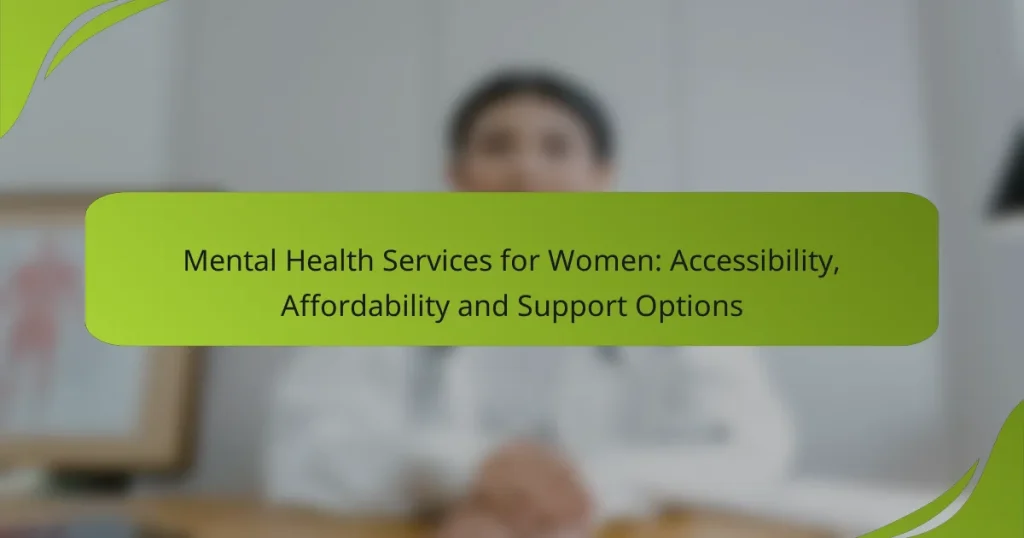Mental health services for women in the United States are designed to address their unique needs, offering a range of options such as therapy, support groups, and online counseling. However, accessibility can be hindered by factors like insurance coverage, geographic location, and financial constraints. Understanding the costs associated with these services is crucial, as they can vary significantly, but there are resources available to enhance affordability and support for women seeking help.
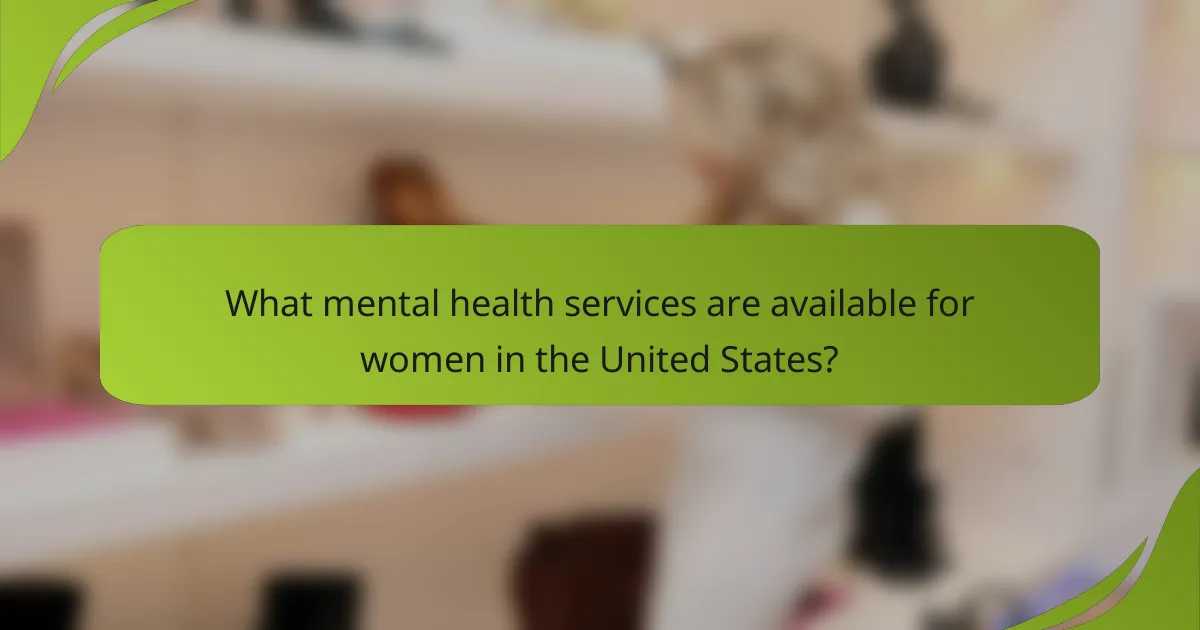
What mental health services are available for women in the United States?
In the United States, women have access to a variety of mental health services tailored to their unique needs. These services include therapy options, support groups, online counseling platforms, community health clinics, and women’s health organizations, all designed to promote mental well-being and provide necessary support.
Therapy options
Therapy options for women can range from individual counseling to group therapy sessions. Common modalities include cognitive-behavioral therapy (CBT), dialectical behavior therapy (DBT), and psychodynamic therapy, each addressing different mental health issues. Women may choose therapists based on their specialties, such as trauma, anxiety, or depression.
When selecting a therapist, consider factors like their credentials, approach, and whether they have experience working with women’s specific mental health concerns. Many therapists accept insurance, which can significantly reduce out-of-pocket costs.
Support groups
Support groups provide a space for women to share experiences and coping strategies in a safe environment. These groups can focus on specific issues such as postpartum depression, anxiety disorders, or trauma recovery. They are often facilitated by a mental health professional or a peer who has experienced similar challenges.
Joining a support group can enhance feelings of connection and reduce isolation. Many organizations offer free or low-cost options, making them accessible to a wide range of women.
Online counseling platforms
Online counseling platforms have gained popularity for their convenience and accessibility. Services like BetterHelp and Talkspace allow women to connect with licensed therapists via video calls, messaging, or phone sessions. This flexibility can be particularly beneficial for those with busy schedules or limited access to in-person services.
Costs for online counseling can vary, but many platforms offer subscription models that may be more affordable than traditional therapy. It’s essential to check if your insurance covers these services to minimize expenses.
Community health clinics
Community health clinics often provide mental health services at reduced costs or on a sliding scale based on income. These clinics serve underserved populations and can offer a range of services, including therapy, medication management, and crisis intervention. They are an excellent resource for women who may not have insurance or who face financial barriers.
To find a community health clinic, visit the Health Resources and Services Administration (HRSA) website, which provides a locator tool for clinics across the country.
Women’s health organizations
Women’s health organizations, such as the National Women’s Health Network and the American Psychological Association, offer resources and support specifically for women’s mental health. They often provide educational materials, advocacy, and referrals to mental health professionals.
These organizations may also host workshops and events focused on mental wellness, empowering women to take charge of their mental health. Engaging with these resources can help women stay informed about their options and connect with supportive communities.
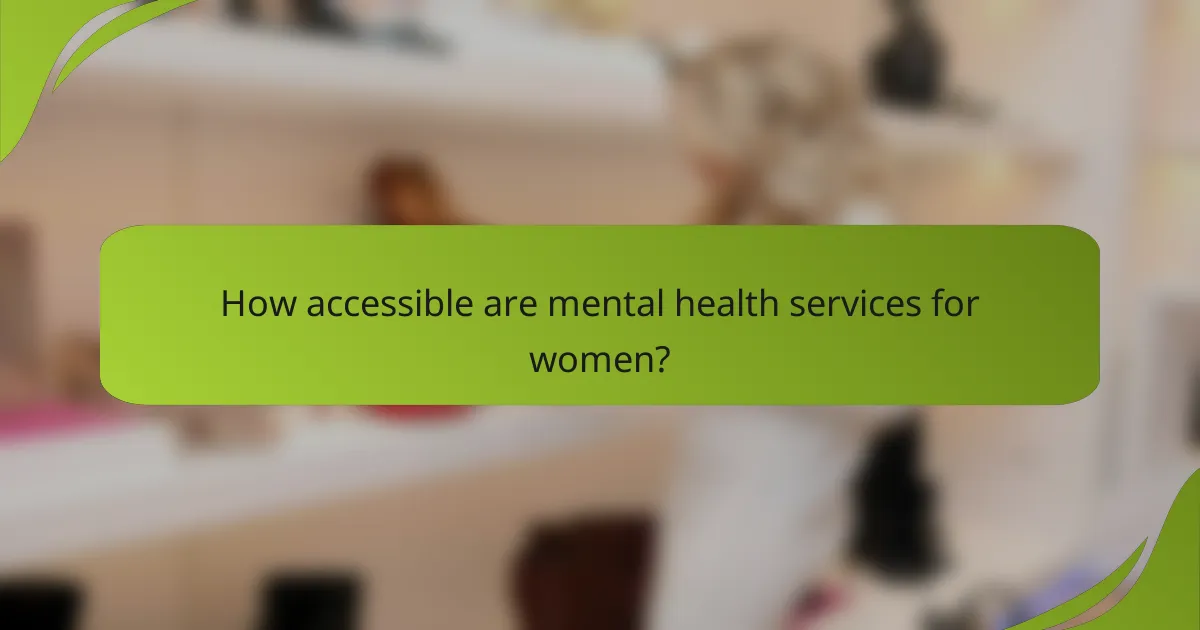
How accessible are mental health services for women?
Mental health services for women vary in accessibility based on factors like insurance coverage, geographic location, and available support options. Many women face barriers that can limit their access to necessary care, including financial constraints and transportation issues.
Insurance coverage
Insurance coverage plays a crucial role in determining access to mental health services for women. Many plans cover therapy and counseling, but the extent of coverage can differ significantly. It’s essential for women to review their insurance policies to understand what mental health services are included and any associated costs, such as copays or deductibles.
Women should also be aware of the Mental Health Parity and Addiction Equity Act, which requires that mental health services be covered comparably to physical health services. This can help ensure that women receive the necessary care without facing excessive financial burdens.
Geographic availability
Geographic availability of mental health services can greatly impact access for women, especially in rural or underserved areas. In many regions, there may be a shortage of mental health professionals, leading to long wait times for appointments or limited options for care.
Women living in urban areas may have more access to a variety of services, including specialized care for issues like postpartum depression or trauma. However, it’s important to research local resources and support networks to find the best options available.
Telehealth options
Telehealth options have expanded access to mental health services for women, allowing them to receive care from the comfort of their homes. This can be particularly beneficial for those with mobility issues, childcare responsibilities, or those living in remote areas.
Many providers now offer virtual therapy sessions, which can be just as effective as in-person visits. Women should check with their insurance providers to see if telehealth services are covered and explore platforms that specialize in mental health care.
Transportation services
Transportation can be a significant barrier for women seeking mental health services, particularly in areas with limited public transit options. Some community organizations and health providers offer transportation services to help women reach their appointments.
Women should inquire about available transportation assistance when scheduling appointments. Additionally, local health departments may have resources or partnerships that facilitate access to mental health services through transportation support.
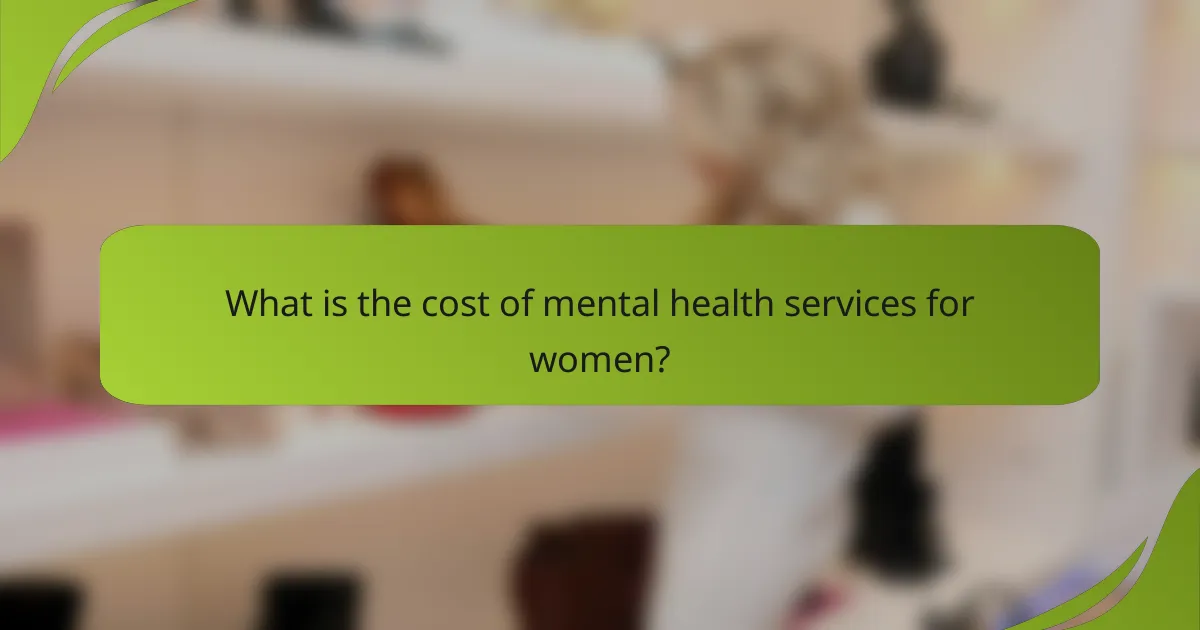
What is the cost of mental health services for women?
The cost of mental health services for women can vary widely depending on factors such as location, type of service, and provider. On average, therapy sessions can range from moderate to high prices, but there are options available to make these services more accessible and affordable.
Average therapy costs
In the United States, the average cost of therapy can range from $100 to $250 per session. Prices may differ based on the therapist’s qualifications, the type of therapy offered, and the geographical area. Urban centers typically have higher rates compared to rural locations.
Insurance coverage can significantly affect out-of-pocket expenses. Many insurance plans cover a portion of therapy costs, which can lower the financial burden for women seeking help.
Sliding scale fees
Sliding scale fees are a payment option offered by some therapists and clinics, allowing clients to pay based on their income. This can make mental health services more affordable for women with lower incomes or financial difficulties.
When seeking a therapist, inquire about sliding scale options during the initial consultation. Many providers are willing to negotiate fees to ensure that services are accessible to those in need.
Government assistance programs
Government assistance programs can help women access mental health services at reduced costs. Programs such as Medicaid in the U.S. provide coverage for eligible individuals, including therapy and counseling services.
It’s important to check eligibility requirements and application processes for these programs, as they can vary by state. Women may also find local community health centers that offer subsidized mental health services.
Nonprofit resources
Numerous nonprofit organizations provide mental health resources and support for women, often at little to no cost. These organizations may offer therapy, support groups, and educational resources tailored to women’s mental health needs.
Examples include the National Alliance on Mental Illness (NAMI) and local women’s shelters that may have mental health programs. Researching local nonprofits can uncover valuable support options that are financially accessible.

What support options exist for women facing mental health challenges?
Women facing mental health challenges can access a variety of support options tailored to their unique needs. These include peer support networks, hotlines for immediate assistance, and workplace mental health programs that promote well-being and provide resources.
Peer support networks
Peer support networks offer women a chance to connect with others who have similar experiences, fostering a sense of community and understanding. These networks can be found in local community centers, online platforms, or through organizations focused on women’s mental health.
Participating in peer support can help reduce feelings of isolation and provide practical coping strategies. Many groups are free or low-cost, making them an accessible option for many women.
Hotlines and crisis intervention
Hotlines provide immediate support for women in crisis, offering confidential assistance and guidance. Many countries have dedicated mental health hotlines that operate 24/7, allowing individuals to reach out at any time.
When using a hotline, it’s essential to have your concerns clearly in mind to maximize the benefit of the conversation. These services are typically free, ensuring that financial barriers do not prevent access to help.
Workplace mental health programs
Workplace mental health programs are designed to support employees’ mental well-being through various initiatives, such as counseling services, workshops, and stress management resources. Many companies are increasingly recognizing the importance of mental health and are implementing these programs to foster a healthier work environment.
Women should inquire about available programs at their workplace, as participation can often lead to improved job satisfaction and reduced stress. Additionally, these programs may include flexible work arrangements or mental health days, which can be beneficial for maintaining balance.
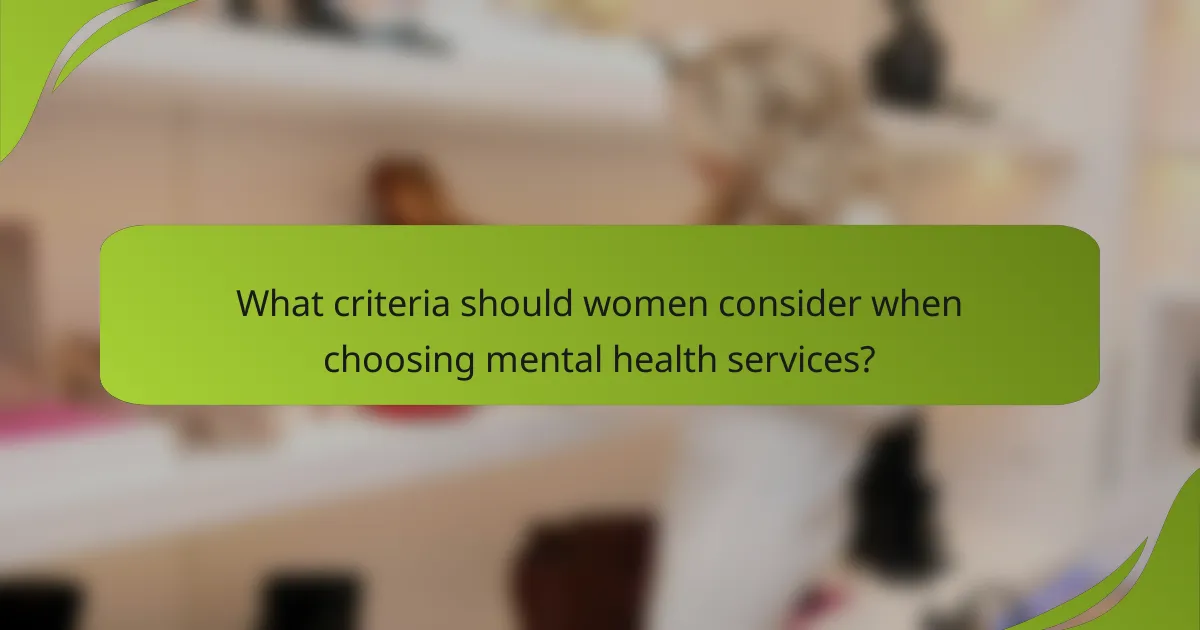
What criteria should women consider when choosing mental health services?
Women should consider provider qualifications, the types of services offered, and accessibility when selecting mental health services. These factors can significantly impact the effectiveness of treatment and overall satisfaction with care.
Provider qualifications
When evaluating mental health providers, it’s crucial to check their qualifications, including education, licensure, and experience. Look for licensed professionals such as psychologists, psychiatrists, or licensed clinical social workers, as they are trained to provide appropriate care.
Additionally, consider any specializations that may align with specific needs, such as trauma-informed care or women’s health issues. A provider’s approach and philosophy should resonate with personal values and comfort levels.
Service types offered
Different mental health services include therapy, medication management, support groups, and holistic options. Women should assess which types of services they might benefit from, whether it’s individual therapy, group sessions, or alternative therapies like mindfulness or yoga.
It’s also important to inquire about the availability of telehealth options, especially for those with mobility issues or time constraints. Many providers now offer virtual sessions, making mental health support more accessible.
